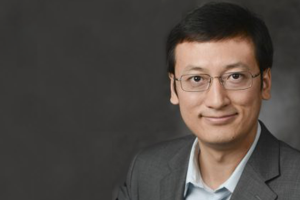
March 8, 2024
Xiao recognized with Excellence in Research Award from Environmental Science & Technology journal
Mizzou Engineering’s Feng “Frank” Xiao has been recognized with an Excellence in Review Award from Environmental Science & Technology (ES&T), the premier journal in environmental engineering and science.
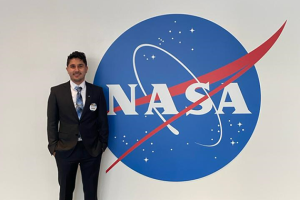
Jan. 24, 2024
Through internship at NASA, Mizzou Engineer finds satellite imagery key to monitoring environmental changes
The ice that used to cover roughly 85% of Alaska is thawing, causing ground to collapse and putting communities at risk. Jaweed Nazary, a Ph.D. student in civil and environmental engineering, has found that satellite imagery is key to pinpointing exactly which locations are most susceptible to these changing conditions.

Dec. 1, 2023
Interdisciplinary team develops fast, reliable model to predict how seeds move
Playing an essential foundational role in an ecosystem, plants contribute to the well-being of human health by helping create resources like food and medicine. Therefore, to better understand how plants can maintain resiliency in the face of challenges like climate change, a team of researchers at the University of Missouri and Michigan State University recently collaborated to develop an innovative mathematical model that can provide fast and reliable predictions of how far wind can carry a plant’s seeds.
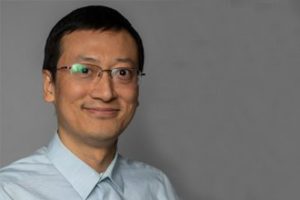
Dec. 1, 2023
Xiao Honored as 2023 Emerging Investigator, Presents Keynote at AWWA Conference
Feng “Frank” Xiao, associate professor of civil and environmental engineering, was honored by the Association of Environmental Engineering and Science Professors (AEESP) as the 2023 Emerging Investigator lecturer and presented a keynote address at the American Water Works Association’s (AWWA) Water Quality Technology Conference in Dallas last month.
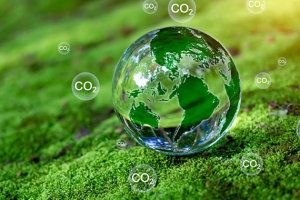
Nov. 10, 2023
Algae-based manufacturing system uses CO2 to create eco-friendly plastic
Biodegradable plastics made from sustainable sources and CO2 are one step closer to reality thanks, in part, to a Mizzou Engineer’s expertise in bioprocesses and bioproducts.
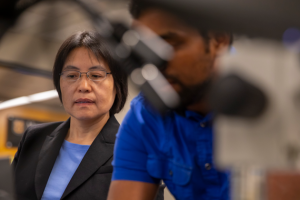
Nov. 2, 2023
Researcher outlines process to simplify manufacturing of solid-state lighting
LED lighting is replacing traditional incandescent lighting across the country. These light-emitting diodes are energy efficient, but also problematic. Not only are they costly, they also emit harsh blue lighting that’s polluting our night sky and interrupting our sleep patterns. Mizzou Engineering’s Peifen Zhu is coming up with better solid-state lighting technology.
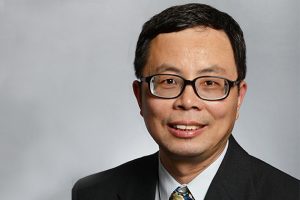
Oct. 26, 2023
Mizzou Engineer part of Dept. of Energy project to cut greenhouse gas emissions at wastewater treatment plants
A Mizzou Engineer is part of a multi-disciplinary team working to improve wastewater treatment processes to cut greenhouse gas emissions by half without increasing costs to plants.

Sep. 29, 2023
Team devising methods to make computer chips more energy efficient, sustainable
A Mizzou Engineering team is devising a method to make computer chips designed to run deep neural networks (DNNs) not only reliable, but also energy efficient and sustainable.
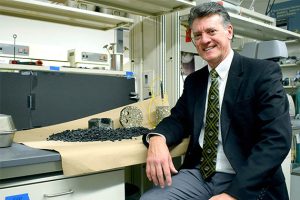
July 20, 2023
Driving innovative solutions for advancing use of ‘plastic’ roads
In partnership with the Missouri Department of Transportation (MoDOT), researchers from the Mizzou Asphalt Pavement and Innovation Lab (MAPIL) recently created a real-world test road using recycled materials like scrap tires and plastic waste along a portion of Interstate 155 in the Missouri Bootheel.
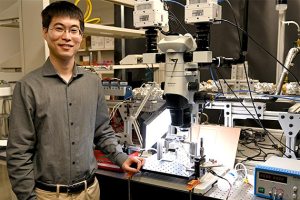
May 23, 2023
Jin works to advance technology to solve climate challenges, meet energy demands
Yue Jin has been interested in nuclear power as a clean energy source since his undergraduate studies at a top-ranked university in China. So, after completing a PhD from Pennsylvania State University and working as a post-doctoral fellow at MIT, he saw Mizzou as an obvious next step.
- « Previous
- 1
- 2
- 3
- 4
- Next »